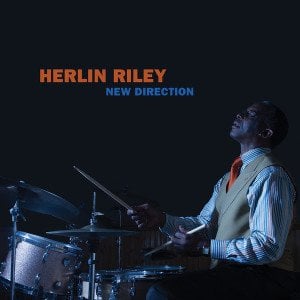 Since coming of age in the nurturing environment of a very musical family and a distinguished bloodline of drummers, New Orleans native Herlin Riley emerged from that most creative era of all things rhythmic in the late ’70s and early ’80s, to enliven the ensembles of such influential and demanding improvisers as pianist Ahmad Jamal and trumpeter Wynton Marsalis through his commanding yet elegant rhythmic presence. His authoritative style of melodic percussion is deeply imbued in the fertile creative soil of the Crescent City, encompassing as it does the entire length and breadth of America’s ongoing musical journey.
Since coming of age in the nurturing environment of a very musical family and a distinguished bloodline of drummers, New Orleans native Herlin Riley emerged from that most creative era of all things rhythmic in the late ’70s and early ’80s, to enliven the ensembles of such influential and demanding improvisers as pianist Ahmad Jamal and trumpeter Wynton Marsalis through his commanding yet elegant rhythmic presence. His authoritative style of melodic percussion is deeply imbued in the fertile creative soil of the Crescent City, encompassing as it does the entire length and breadth of America’s ongoing musical journey.Now the release of his debut recording for Mack Avenue Records, Riley’s New Direction (available on Feb. 12) is an engaging, wide-ranging recital that distills a lifetime of experience into a swinging body of new music that defines what a big tent the music of New Orleans has always represented stylistically and spiritually.
This joyous cultural amalgam of Afro-Cuban, jazz and blues speak not just to Riley’s command of all things swinging — from the formative days of Sidney Bechet and Louis Armstrong — but which evoke, what for want of a better term we might call “the pocket” — those deeply dancing grooves that have nurtured parallel streams of rhythm & blues and funk in the tradition of such great Crescent City drummers as Vernel Fournier, Earl Palmer, Ziggy Modeliste and Idris Muhammad.
“You see,” Riley explains, “New Direction reflects a personal transition from being a musical associate with the likes of Ahmad and Wynton, to functioning in a leadership capacity, both as a bandleader and a composer. Like Art Blakey, I’m trying to maintain a certain exuberance by using all younger musicians, while helping them develop their own voices. So many great musicians and drummers have come out of New Orleans, and that really defines my personal legacy; I’m standing on the shoulders of giants. But I’ve been playing drums since I was three years old; so, while the title New Direction may suggest new bottles, this is surely some well-aged wine.
“As a boy growing up in New Orleans, way before you heard that big bass drum in the street parades, you could feel it coming from four or five blocks away, and it would literally beckon you to come on down to the street, check out this music, and participate in it. On ‘Connection to Congo Square’ I quote the ‘Reveille’ in my intro. It reflects the melodic nature of how I tune my tom toms and is also a symbolic call to arms, for all the cats from the different neighborhoods to gather ‘round, and participate in this celebration, this collective dialog.”
Well-traveled listeners might hear echoes of Dizzy Gillespie and Chano Pozo in the Afro-Cuban celebrations of “The Crossbar” and “Connection To Congo Square.” The down and dirty groove of “Harlem Shuffle” suggests a connection to Benny Golson’s venerable “Killer Joe,” while the title tune (in the person of guest guitarist Mark Whitfield) evokes echoes of George Benson and those classic hard bop and grooving CTI sessions of yesteryear.
So when Riley and his band reference iconic elements of the jazz tradition, listeners might very well smile contentedly in recognition of audible gems with which they are conversant. Nevertheless, throughout New Direction, Riley and company also essay a very personal, original rhythmic signature on visceral, dancing arrangements such as “The Big Banana,” “Herlin’s Hurdle” and “Hiccup Smooth.” As Riley explains it, “in everything I play, there’s some reference from my own personal experience, and while it may not be explicit, it’s all underneath there somewhere.